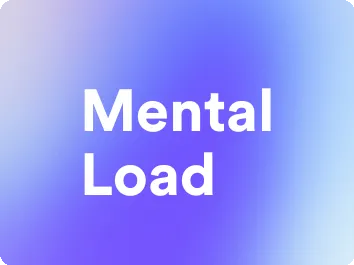Mental Load: Understanding and Managing Cognitive Burden
This guide will walk you through the essential elements of using mental load - the productivity method to keep your team productive and engaged.
Try Lark for Free
Preface:
Mental load, often referred to as cognitive load, is a concept that encapsulates the cognitive resources required to manage the numerous tasks and responsibilities of daily life. Understanding mental load is crucial for achieving a balanced and productive lifestyle. In this comprehensive guide, we will delve into the origins, implications, and strategies for effectively managing mental load.
What is Mental Load in the Context of Productivity?
Mental load, in the context of productivity, encompasses the cognitive efforts and considerations involved in planning, organizing, and executing tasks and responsibilities. It relates to the mental burden associated with managing multiple facets of life, contributing significantly to one's overall well-being and efficiency.
Understanding the Components of Mental Load
Mental load comprises various components, including:
-
Emotional Burden: The emotional labor and empathy required to manage relationships and familial responsibilities.
-
Logistical Planning: The detailed planning and organization needed to orchestrate daily routines, tasks, and schedules.
-
Cognitive Management: The mental capacity required to make decisions, solve problems, and multitask effectively.
Exploring mental load in the context of productivity provides insights into its profound impact on individuals' daily lives and overall productivity.
The Origins of Mental Load
The conception of mental load originates from the sociological and psychological discourse, shedding light on the unequal distribution of cognitive labor within households and workplaces. Its roots can be traced to the complexities of balancing personal, professional, and familial obligations.
Use Lark to unleash your team productivity.
Who Does Mental Load Affect?
Mental load is a pervasive phenomenon that affects individuals across diverse demographics. It particularly resonates with:
-
Working Professionals: Balancing career demands with personal responsibilities amplifies the mental load.
-
Parents and Caregivers: Managing the cognitive labor associated with childcare, household duties, and familial obligations.
-
Students and Academicians: Juggling academic pursuits, extracurricular activities, and personal commitments contributes to significant mental load.
Understanding the demographics affected by mental load is pivotal in devising strategies for effective management and alleviation.
Pros and Cons of Mental Load
Pros
-
Enhanced Organizational Skills: The cognizance of mental load fosters improved organizational abilities and time management competencies.
-
Adaptive Decision-Making: Managing mental load encourages the development of adaptive decision-making skills, essential for navigating complex scenarios.
Cons
-
Potential Burnout: Excessive mental load can lead to burnout, resulting in decreased productivity and overall well-being.
-
Emotional Exhaustion: The emotional toll associated with heightened mental load can lead to emotional exhaustion and strained relationships.
A balanced understanding of the pros and cons of mental load illuminates its significance in individuals' lives and underscores the need for effective management strategies.
Learn more about Lark x Productivity
Getting Started with Managing Mental Load
Navigating mental load begins with acknowledging its presence and significance in one's life. Several foundational steps can assist individuals in embarking on the journey of managing their cognitive burden:
-
Self-Assessment: Reflect on personal and professional commitments to identify cognitive load hotspots and stressors.
-
Prioritization: Categorize tasks based on urgency and importance to streamline cognitive efforts effectively.
-
Communication: Establish open communication channels in personal and professional spheres to delegate, collaborate, and alleviate mental load.
-
Resource Utilization: Leverage digital tools and resources to streamline organizational and planning endeavors.
Use Lark to unleash your team productivity.
Actionable Tips for Managing Mental Load
Do's
| Do's |
|---|
| Practice delegation and collaborative approaches. |
| Foster open communication channels within personal networks. |
| Embrace mindfulness practices for stress reduction. |
| Prioritize physical well-being through regular exercise. |
| Leverage digital organizational tools for streamlined management. |
Dont's
| Dont's |
|---|
| Neglect personal care and well-being in pursuit of productivity. |
| Ignore communication channels, leading to isolation and cognitive burden. |
| Engage in overcommitment, leading to heightened mental load. |
| Underestimate the value of prioritization and time management. |
| Overlook the significance of adequate rest and downtime. |
